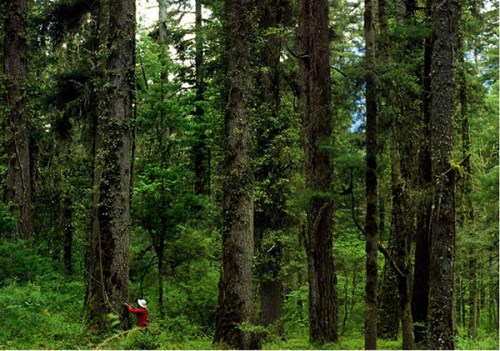
Xu Fengxiang (in red) makes a field research in the Gangxiang Spruce Forest in the 1980s. (Photo provided to chinadaily.com.cn)
At nearly 5,000 meters above sea level, there ran two vehicles – an SUV and a truck – along the wildness of rolling alpine steppes studded with sand dunes, saline lakes and wetlands.
It was 1992. A seven-person ecology team spent more than one month driving some 14,000 km to do research in Chang Tang, a high altitude plateau in northern Tibet autonomous region. A year later and thanks to their efforts, the vast region was protected as a nature reserve with an area covering 247,000 sq km, the second largest of its kind in the world.
"As we drove into night one day, we saw flickering lights about hundreds of meters ahead and thought there would be inhabitants," recalled the team head Xu Fengxiang, 84, on a visit to eastern Tibet's Nyingchi city, where she founded China's first high-altitude ecology research institute 30 years ago.
The reddish-greenish flashes turned out to be the eyes of more than a dozen adult wolves. When the ecologists realized the danger, the howling pack had already surrounded them.
"The moment my driver rolled down the window and aimed a gun at the wolves, I stopped him," said Xu, the only woman of the research team. "I gave him three instructions – turn on both rear and head lights, blow the whistle and drive at a slower speed."
These instructions finally helped them break out of the siege of wolves.
Although it took place 23 years ago, the 84-year-old legend's memory of this thrilling adventure is still vivid. Age has not dulled her sharp mind or senses.
"This incident proved my point that there is active wildlife, including wolves, Tibetan gazelles, snow leopards and varieties of plants, in the so-called lifeless zone," said Xu, who proposed the region should be protected.
The ecologist had a maverick view of the relationship between man and nature. She insisted human beings have an equal status with other animal and plant species, which co-exist in the ecosystem.
"Man is nothing but one tiny biotic component in the entire ecosystem, and man should place himself at the mercy of nature rather than seek power over it at its source," she said.
Xu's love affair with nature has been running deep through her veins her whole life.


















































